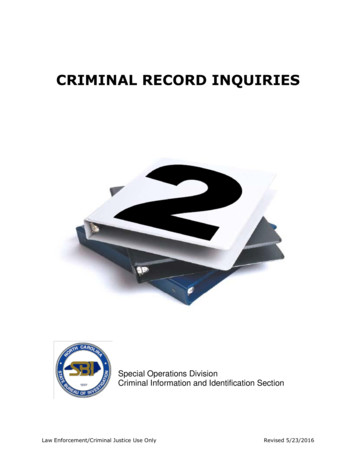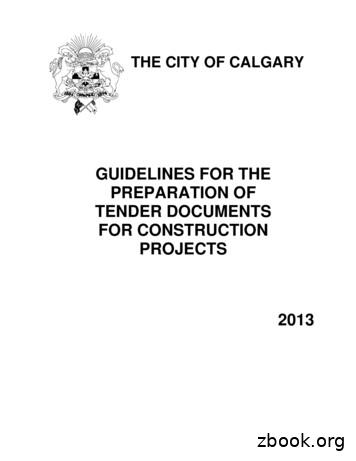2020 REVISED CURRICULUM AND ASSESSMENT PLANS
2020 REVISED CURRICULUMAND ASSESSMENT PLANSGRADE RLIFE SKILLSImplementation: JULY/ AUGUST 2020
Presentation Outline1. Purpose2. Amendments to the Content Overview for thePhase;3. Amendments to the Annual Teaching Plan;4. Amendments School Based Assessment (SBA)5. Conclusion
1. Purpose To mediate the amendments of the revisedAnnual Teaching Plan 2020 including SchoolBased Assessment for LIFE SKILLS IN Grade Rfor implementation in June 2020 as stipulated inCircular S . To ensure that meaningful teaching proceedsduring the remaining teaching time as per therevised school calendar. To assist teachers with guided pacing andsequencingofcurriculumcontentandassessment.
1. Purpose (continued) To enable teachers to cover the essentialcore content /skills in each grade within theavailable time. To assist teachers with planning for thedifferent forms of assessment. To ensure learners are adequately preparedfor the subsequent year/s in terms of content,skills, knowledge, attitudes and values.
2. Amendments to the ContentOverview for the FoundationPhase- Grade R
Subject: Life Skills During this phase and addressing the importance ofsocial distancing and staying healthy, Life Skills willaddress social health, emotional health andrelationships with other people and ourenvironment, including values and attitudes. Holistic development of the learner and keeping themgrounded, is key. Disinfection and social distancing are strictrequirements which will be adhered to in preventingthe spread of COVID 19.
Grade R Topics across Term 2 to 4GRADE RWEEK 1TOPICS:TERM 2HOMETOPICS:TERM 3TOPICS:TERM 4WEEK 2WEEK 3MY REPTILESGRADE RWEEK 1WEEK 2TOPICS: TERM2SAFETYORIENTATIONMY FAMILYTOPICS: TERM3WINTER/AUTUMNTOPICS: TERM4SPRING/SUMMERWEEK 4WEEK 5WEEK 6WEEK 7WEEK 8WEEK 9WEATHERAUTUMNSOUNDSIGHTTOUCHTASTE &SMELLFRUITVEGETABLESFARMING:DAIRYFINDINGOUT ABOUTONE ALTHYENVIRONMENTCONSOLIDATION OFTOPICSWEEK 3WEEK 4WEEK 5WEEK 6WEEK 7HOMEWINTERSOUND &SIGHTTOUCH, &SMELLTASTETRANSPORTJOBS PEOPLEDOFRUIT &VEGETABLESHEALTHYENVIRONMENTCONSOLIDATION OF TOPICSBIRDSREPTILESDINOSAURSFESTIVALS AND SPECIAL DAYSASSESSMENTFARMING:DAIRY &WOOLWILD ANIMALSSPORTSCONSOLIDATION OF TOPICS
Summary: Amendments to the ContentOverview for the Foundation PhaseLifeSkillsGrade 1Grade 2Grade 3Beginning Knowledge andPersonal Social Well-being(BKPSW) Beginning Knowledge andPersonal and Social Wellbeing in the Life Skillscurriculum are organised inthe given CAPS topics. Orientation to take place inweek 1 but learners shouldbe conscientised aboutthese EACH day Adhere daily to COVID-19measures.Social distancing, washingof hands and wearing ofmasksCreative Arts Visual Arts: allowlearners to use theirown apparatus oralternatively use theapparatus in groups ondifferent days to allowfor sanitizing.All equipment to besanitized after everyuse.Performing Arts:Activities have beenadapted to ensuresafety. use learnerown space – socialdistancingPhysical Education Activities have beenadapted to ensure thatPhysical Education takesplace so that learnersdevelop perceptual andother skills Limit activities withresources that can spreadthe virus. All equipment to besanitized after every use. Adhere daily toCOVID-19 measures:Maintain socialdistancing. washing ofhands and wearing ofmasks
Summary: Amendments to the ContentOverview for the Life Skills study areasBKPSWGrade RCreative Arts The first week’s Creative andorientation topic ofPerforming Artsre-opening isCAPS trimmedmerged with thecontent availableCOVID 19and the proposedinformation.content to teach CAPS content hasper week/topic arebeen spread acrossspecified with a Xthe weeksin each grade. Some topics have Teaches still have abeen merged –choice- Performingnatural linksArts COVID 19prescripts must beadhered tosanitizing of allequipment afteruse by one child.Physical Education Physical Educationtrimmed skills andcontent arepresented to teachper week/topicand indicated witha X in each grade. Outdoor play canONLY take place if ademarcated largeenough area isavailable withdemarcated areas NO Jungle Gymactivities andobstacle courses
3. Amendments to the AnnualTeaching Plan
Annual Teaching Plan The work for term 2, 3 and 4 has been reorganised and spread over the givenweeks. The teacher must record what she hascompleted on a week by week basis. Acommon template can be used for thispurpose.
Summary: Reorganisation ofcontent topics Knowledge, skills, values, and attitudes withineach Life Skills study areas were reorganisedand incorporated into the COVID 19curriculum trimmed document. The content is therefore mapped out for eachsubject and grade, setting out the knowledge,skill and content to be covered per week andper term It sets the foundation for integration for HomeLanguage
Summary: Amendment to theweighting of content topics Deviations to the time allocation in Life Skills Provision has been made for Term 2 Topics have been spread over a period of 21weeks to cover the curriculum Weather, festivals and special days will be anatural daily activity
Summary: Content/TopicsAmendedContent/TopicsCreative ArtsTerm2, 3, 4Physical Education2, 3, 4Amendment The use of materials and LTSMCOVID 19 restrictions and healthypractices integrated with theactivities Physical Education sessions isincluded for indoor movement withinlearners’ space on or in front of theirchair. If space allows, in demarcatedareas outside. COVID 19 restrictions integratedwith the activities (amendments) No partners or group activity
4. Amendments School BasedAssessment (SBA)
SCHOOL BASED ASSESSMENT Assessment for and of learning willcontinue to be implemented on acontinuous basis in Life Skills. Teacher to use checklists and rubrics
Summary: Revision FinalExamination Structure Term 3 and Term 4 only
4. Recommendations
Recommendations Reducing the number of display areas (closeareas and pack away resources) -which will givemore space for the learners to sit/stand/moveand reduce the temptation of the learners tofiddle and touch the display items. The theme table remains and is only touched bythe teacher. Items which are easily accessible canbe brought by the learners and teacher toobserve. These must be sanitized. Learners must keep their distance and onlyobserve these items from a distance unless theyhave their own.
Recommendations Create a “COVID safe/ty corner” place the sanitizingcontainers, water and soap, mask sealed in a transparentplastic bag and thermometer so that they become partand parcel of the class environment. Initially discussfrequently to reinforce use and importance daily. Examples - Songs with actions should be used to teachlearners correct way to wash hands (wash hands for 20seconds) – not to touch their face, be aware of touchingsurfaces, greeting and how to sneeze and coughcorrectly. Display a Poster in the “safety corner” with clear pictures(showing the order) for young learners about the basicsteps to be safe – wash hands, sanitizer (explain what thisis (look, touch and smell) and why/how we must use it)and social distancing.
Recommendations Creative ways should be considered to help ourlearners adapt to social distancing in the classroom.E.g. use brightly colour tape to make a mark “X” whereeach learner can sit for greeting, story or movement onthe spot. Place a dot/sticker on tables where they can sit ingroups. Make the most of the floor space, sitting onmats and at tables. Move tables so that all the learnerscan sit on plastic mats or cardboard mats. By doing this consistently the learners will learn whatto do and feel safe in their classroom Routine will create discipline and a safe environment.
Recommendations Introduce the additional rules during Orientationand Safety week and then reinforce DAILY. Thesecan be visually illustrated on a chart. Show learners through song and rhymes how topractice social distancing i.e. spread out arms toside, [right and left, front and back] and no onecan come into that space when doing activities,walking to toilet and eating. diligently supervise moving from one place toanother and eating routine.
Recommendations Resourcing for the daily activities will require carefulplanning. Consider each learner having a container oftheir own with scissors, crayons, bag of play doughand name tag. Where resources are limited ways of sanitizing must beprioritized in planning. Books, puzzles, cardboardgames (dominoes) are wiped down with dampsanitized cloth. Other items such as brushes, scissors, crayons, beads,cubes, blocks, instruments, plastic spades buckets andplastic objects to be washed after use every day beforethe next group uses it.
Recommendations Whilst disinfection and social distancing are strictrequirements which will should be adhered to inpreventing the spread of COVID 19, activities suchas Physical Education and Creative Arts areimperatives in the curriculum. Carefully planned outdoor play (15 minutes eachday) can take place under strict supervision. Nosharing of any equipment unless it has beensanitized and the use of the Jungle gym isstrongly discouraged. Learners are to use theirown bean bag, or a ball made from crumblednewspaper.
5. Conclusion
Conclusion Life Skills is the vehicle to develop learners holisticallyand address psycho social support. It keeps learnersgrounded and provides a safe space where learnerssing, dance and do movement. Whilst it develops important skills as a foundation forlearning, it provides an outlet and is therapeutic. The importance of Life Skills must be consciouslyconsidered daily.
Conclusion It is still possible to cover all the study areas in LifeSkills in the Grade R Although Life Skills is not used for progressionpurposes in the Foundation Phase, the foundationalskills are important as it is progressively developed;holding tools, spatial orientation, pre-reading andpre-writing skills. Skills can further be strengthened in 2021 when thelearner progresses to the next grade. The Grade R teacher will be able to cover thecurriculum during this exceptional time.
ConclusionCreate a safe, friendly, stable, loving environment for ourlearners.Teachers are to be mindful of the following:o Learners could be traumatized due the impact of the COVID 19.o A positive, self-confident learner before the lockdown, can now displayfeelings of insecurity and changed behavioural patternso Some may have family members/friends who were/are affected.o Learners may experience separation anxiety from parents/caregivers. Grade R teachers have a critical role play. Be observant and offerpsycho social support at classroom/school level Next level support to be put in place for urgent intervention
Contact DetailsName: Director GET Department of BasicEducationTel: 012 357 4140Email: modiba.k@dbe.gov.za
2020 REVISED CURRICULUM AND ASSESSMENT PLANS GRADE R LIFE SKILLS Implementation: JULY/ AUGUST 2020. Presentation Outline 1. Purpose 2. Amendments to the Content Overview for the . To mediate the amendments of the revised Annual Teaching Plan 2020 including School Based Assessment for LIFE SKILLS IN Grade R for implementation in June 2020 .
Student Training Manual/Workbook . 5 Law Enforcement/Criminal Justice Use Only Revised 5/23/2016 Revised By: Revised Date: Revised By: Revised Date: Revised By: Revised Date: Revised By: Revised Date: Revised By: Revised Date: Revised By: Revised Date: Revised By: Revised Date: Marie Jernigan Supervisor Training Unit SBI Criminal Information and Identification Section May 23, 2016 Jeannie .
Handbook for Curriculum Assessment Curriculum Assessment: An Overview What is curriculum assessment? Curriculum assessment is a process of gathering and analyzing information from multiple sources in order to improve student learning in sustainable ways. Why bother assessing curriculum? Curriculum assessment can serve several major purposes:
3.0 TYPES OF CURRICULUM There are many types of curriculum design, but here we will discuss only the few. Types or patterns are being followed in educational institutions. 1. Subject Centred curriculum 2. Teacher centred curriculum 3. Learner centred curriculum 4. Activity/Experience curriculum 5. Integrated curriculum 6. Core curriculum 7.
Standard Hill North Mannville Sands Pool. Revised PO. Standard Hill West McLaren Sand Pool. Revised PO. Storthoaks Tilston Beds Pool. Revised PO. Verendrye Viking Sand Pool. Revised PO. Wauchope Central Tilston Beds Pool. Revised PO. White Bear Tilston-Souris Valley Beds Pool. Revised PO. Workman Frobisher Beds Pool. Revised PB.
EU Tracker Questions (GB) Total Well Total Badly DK NET Start of Fieldwork End of Fieldwork 2020 15/12/2020 16/12/2020 40 51 9-11 08/12/2020 09/12/2020 41 47 12-6 02/12/2020 03/12/2020 27 57 15-30 26/11/2020 27/11/2020 28 59 13-31 17/11/2020 18/11/2020 28 60 12-32 11/11/2020 12/11/2020 28 59 12-31 4/11/2020 05/11/2020 30 56 13-26 28/10/2020 29/10/2020 29 60 11-31
assessment. In addition, several other educational assessment terms are defined: diagnostic assessment, curriculum-embedded assessment, universal screening assessment, and progress-monitoring assessment. I. FORMATIVE ASSESSMENT . The FAST SCASS definition of formative assessment developed in 2006 is “Formative assessment is a process used
3.5 09 (e) Form of Tender (Yellow Sheet) Revised 3.5.13 Prime Contractor Management Status Revised 3.5.14 (a) Bid Bond Revised 3.5.15 (a) Consent of Surety to Furnish Bonding Revised 3.5.17 Waiver Form Revised 4.1 Closing and Awarding of Tenders Revised 4.1 (c ) Closing of Tenders, Evaluation and Award Recommendation Revised
opinions about the courts in a survey conducted by the National . criminal justice system, and that black women are imprisoned at a rate seven times greater than white women. The report indicates there has been an increase in their incarceration rate in excess of 400% in recent years. Further, three-fourths of the women, according to the report, were mothers, and two-thirds had children .























